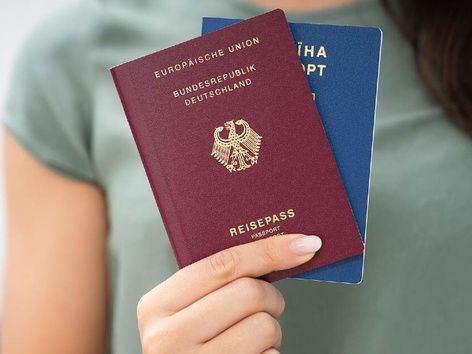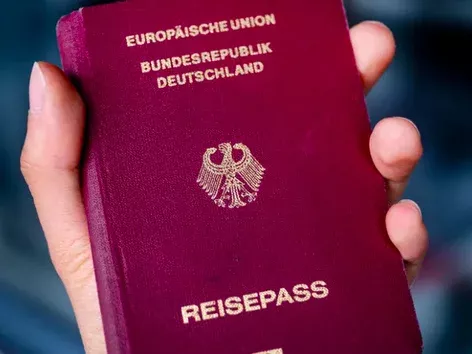Dual citizenship in Germany 2024: the main provisions of the new draft law

As of January 2024, a new law on dual citizenship may enter into force in Germany, which is being considered in light of the agreements reached. Despite two postponements of the vote on the law, the coalition announced that it had resolved previous differences and was moving forward with the law. Read more about the adoption of the German dual citizenship law
Germany's dual citizenship law could officially come into force in January 2024, according to an agreement reached by a coalition of parties. Despite two postponements of the vote, the settlement of differences between the parties gave the green light for the law to proceed. The second and third readings and voting will take place in January 2024, and if all goes well, the law will be officially enacted in April 2024. This initiative opens up new opportunities for foreigners legally residing in Germany to retain their primary citizenship and simultaneously obtain German citizenship.
One of the key innovations in the law on dual citizenship in Germany is the possibility for foreigners legally residing in the country to retain their primary citizenship and also obtain German citizenship without losing their previous status. However, it is important to keep in mind that applications for German citizenship may take different amounts of time, possibly several years, to be processed in different regions of Germany.
Another significant change is the facilitation of the citizenship procedure for those who speak German and have achieved significant success in their professional field. Such persons can expect to have their waiting period reduced from the three years usually required to obtain citizenship.
If you have any questions during your move, please consult an international lawyer. We help you solve complex and simple issues for your comfort and safety in Germany. Our experts are ready to provide you with professional advice and assistance in resolving all legal issues related to your stay in Germany.
Key provisions of the law on dual citizenship in Germany
The introduction of the law on dual citizenship in Germany, scheduled for January 2024, will open up new prospects for foreigners legally residing in the country. According to the new rules, foreigners will be able to retain their primary citizenship and, at the same time, obtain German citizenship without renouncing the other.
However, it is important to keep in mind that the processing time for applications for German citizenship can vary significantly depending on the region of the country. In some areas, this process can take several years, and you should keep this aspect in mind when planning.
Another important benefit of the new law is that those who speak German and have achieved success in their professional field will be able to obtain citizenship without waiting for the three-year period, as it was before. This will simplify the integration process for those who are actively involved in local society and deeply embedded in German culture.
The procedure for adopting a law on dual citizenship in Germany
The latest postponement of the consideration of the law on dual citizenship in Germany indicates deep divisions between political forces. The German Free Democratic Party (FDP), the Social Democratic Party (SPD) and the Greens have not reached an agreement on important changes that affect non-EU citizens receiving unemployment benefits.
The Social Democratic Party (SPD) opposed restrictions on non-EU citizens receiving benefits from obtaining dual citizenship. The party believes that the majority is entitled to this status, especially given the approval of the new law. An important position was also stated that the restrictions should not apply to the generation of guest workers, migrants from Turkey who came to Germany between 1955 and 1973 to work.
By the way, the SPD warns that the stricter conditions of dual citizenship should not apply to disabled people who are not EU citizens and have previously received assistance from the German government.
One of the proposed changes was to limit the right to dual citizenship to non-EU residents who receive unemployment benefits. This approach is supported by the FDP, but faced a strong opposition from the SPD. The latter party emphasized that the majority has the right to dual citizenship, regardless of the conditions of social support.
An important aspect in this dispute was the disabled, who are not EU residents and receive assistance from the German government. The SPD advocated that stricter rules should not apply to this group, emphasizing their special need for protection and attention.
These debates hit on key aspects of the future law and its impact on social justice in the context of dual citizenship in Germany.
The editors of Visit World recommend using the Travel Guide for Germany for a comfortable and safe trip.
The guide is a detailed written document that contains basic advice on obtaining a visa, crossing the border, getting a job, citizenship, and much more. More details at the link.
Products from Visit World for a comfortable trip:
Checklist for obtaining a visa and necessary documents in Germany;
Legal advice on immigration in Germany;
Travel insurance for foreigners in Germany;
Medical insurance all over the world.
More articles on the topic:
Paragraph 24 for refugees: eligibility for a residence permit for asylum seekers in Germany.
Recommended articles
2 min
For refugees
Paragraph 24 for refugees: eligibility for residence permit for asylum seekers in Germany in 2025
Upon arrival in Germany, refugees from Ukraine must apply for temporary protection. This process is regulated by § 24 of the German Foreigners' Legal Status Act. It is on the basis of this section that refugees receive a temporary residence permit "Aufenthaltstitel". Find out how to obtain a temporary residence permit in Germany
15 lis. 2025
More details2 min
Expats
The German Bundestag and the House of Federal States have approved a new draft law on citizenship. According to the new law, foreigners wishing to obtain German citizenship do not have to renounce their own citizenship. Find out more about what changes migrants should expect
07 lut. 2024
More details2 min
Residence permit
Visa-free travel for Israelis in Germany: what you need to know
From 26 January, Israelis can stay in Germany without a residence permit until 26 April 2024. This decision was made to ease the visa regime for Israelis after the Hamas attacks. Learn more about the details of visa-free travel for Israelis in Germany
12 lut. 2024
More details1 min
Popular
ITB Berlin 2024: Visit World took part in the exhibition for the second time
ITB Berlin is the largest international trade fair for the travel industry. This year Visit World is taking part in it for the second time. We will tell you how the event is going and what is VU's goal at ITB Berlin 2024
06 mar. 2024
More detailsAll materials and articles are owned by VisitWorld.Today and are protected by international intellectual property regulations. When using materials, approval from VisitWorld.Today is required.
